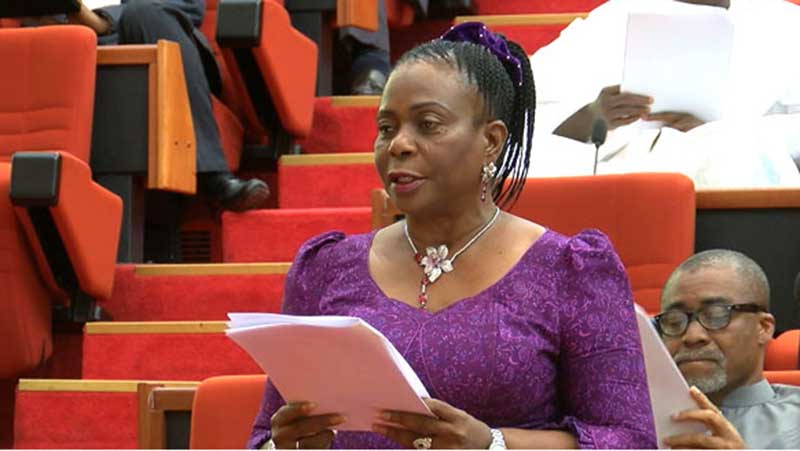Contrary to the belief that the gender equality bill seeks to violate religious laws, the legislation just promotes fairness and justice for both sexes and adherents of all religions in Nigeria.
Biodun Olujimi, a senator from Ekiti state, first presented the bill in March 2016, but it was shot down by a faction of senators led by Ahmed Yerima from Zamfara state.
Yerima had said the bill was against the tenets of sharia law because it proposed to erode men’s rights by eliminating discrimination in areas of marriage, divorce, education, employment opportunities, ownership of property and inheritance.
He was supported by senators like Adamu Aliero (Kebbi state) and Emmanuel Bwacha (Taraba state).
Majority of the senators voted that the bill be trashed.
Advertisement
Senate President Bukola Saraki had assured Nigerians, who protested the non-passage of the bill, that it could be re-introduced after being reworked to pull out paragraphs that an all-male opposition described as offensive.
Olujimi reintroduced it to the senate five months later, precisely in September, rewording certain parts that were considered “offensive”.

Advertisement
This time, with watered down contents, it scaled through second reading. Yet some people received it with angst. Sa’ad Abubakar, the sultan of Sokoto, rejected the bill.
The sultan, who is the president-general of the Nigeria Supreme Council for Islamic Affairs(NSCIA), had rejected the bill on the premise that it negates the principles of Islam.
But it wasn’t only the Sultan who opposed the bill, Muslim women under the body of federation of Muslim women association of Nigeria (FOMWAN) aligned with the sentiments of the monarch.
“The share of a woman or girls is not necessarily equal to that of their female counterparts who are also partaking in the inheritance. There are situations that a woman takes more share than a man. See Quran 4:11-12”, the group had held.
Advertisement
But the bill, long titled “A bill for an Act to Incorporate and enforce certain provisions of the United Nations Convention on the elimination of all forms of discrimination against women, the Protocol of the African Charter on Human and People’s Rights on the rights of women in Africa, and other matters connected therewith, 2016 (SB. 301)”, rather than violate Islamic laws, buttresses chapters 2 and 4 of the constitution, the Convention on the Elimination of all Forms of Discrimination against Women (CEDAW) and the protocol to the African Charter on the Rights of Women in Africa.

The bill is also to give effect to the international convention on human right which affirms the principle of non-discrimination and that all human beings are born free, equal in dignity and rights, and that everyone is entitled to all the rights set out without distinction of any kind including distinction based on sex.
WHAT THE BILL REALLY IS
Advertisement
The bill is an act to incorporate and enforce certain provisions of the united nations convention on the elimination of all forms of discrimination against women, the protocol to the African charter on human and people’s rights on the rights of women in Africa.
If passed, the bill will stop any person, public or private organisation from discriminating through words spoken, acts, inactions, omissions, laws, regulations, administrative procedures, policies, guidelines, rules, customs or practices discriminate against any person on the ground of gender, age or disability.
Advertisement
It seeks to void any law, custom or practice which constitutes discrimination. The bill will ensure that that no individual or institution rules or directive which is in violation of the bill shall be enforced against any person.
The bill also seeks to accord women, children and other persons equality before the law. It guarantees women equal right to conclude contracts and administer property and seeks to treat women equally with men in all stages of court proceedings.
Advertisement
The bill also seeks to ensure that no legal contracts restricts or discriminates against anyone in terms of legal capacity and seeks to stop any individual, public or private organisation from denying women any benefits just because she is a woman.
ACCESS TO HEALTH CARE
Advertisement
The gender equality bill requires that pregnant women and mothers of children two years and below gets access to free medical care to reduce maternal and infant mortality.
The bill seeks to reserve a minimum of 35 percent of all offices or positions for women in political and public administration to encourage more women in positions and decision-making circles.
EQUALITY IN FAMILY LIFE
The bill seeks to ensure that the values, practices and forms of upbringing of children in the family or community is not discriminatory and promotes a proper understanding of maternity and the recognition of the common responsibility of men and women in the upbringing and development of their children.
It seeks to abolish unfair, humiliating and degrading treatment of widows and guarantees a widow’s right to guardianship and custody of her children after the death of her husband unless it is contrary to the best interest and welfare of the child.
The bill also seeks to protect the widow’s right to marry the person she wants, inherit her husband’s property and continue to live in her matrimonial home, and in the case of re-marriage, retain the house if it belongs to her.
The gender equality bill seeks to ensure that children, regardless of their sex, can equitably inherit property of their parents.
EQUAL OPPORTUNITY IN SCHOOLS AND WORK PLACE
The bill seeks to ensure that every individual, public or private organisation takes all appropriate measures to eliminate discrimination against women in the political and public life. This means that women and men have equal access to political activities, can vote and be voted for, participate in the formulation of policies and implementation.
The bill seeks equal conditions for women regarding educational career and vocational guidance. It seeks the elimination of stereotypes of roles of men and women at all level of education and encourage coeducation.

The bill seeks to ensure that organisations, private or public, uphold the right of both sexes to work and stop the discrimination of women in the employment occupation or profession. It seeks to protect the right of women to equal opportunities, including the same application criteria and the right to work commensurate with skill and competence.
The bill, if passed, will promote right to free choice of employment and equal treatment and consideration in the areas of promotion, job security and all benefits and conditions of services. The right to equal remuneration of persons of equal skill, competence, expertise and knowledge.
The right to paid maternity leave or any such leave relating to her maternity need, right to sick leave or concession relating to her maternity needs. Be given equal opportunity to represent organs of organisations, public and private in any official capacity to represent Nigeria,
The bill seeks to empower the National Human Rights Commission to enforce and implement the provisions of the bill and stipulate consequences for the violation of the laws enshrined in the bill.
1 comments







seriously I would have loved to comment here but you need to read this just to realise that women empowerment is a scam, women didn’t even need to vote or to fight for anything because it was all provided for them by their husbands. http://www.singularity2050.com/2010/01/the-misandry-bubble.html